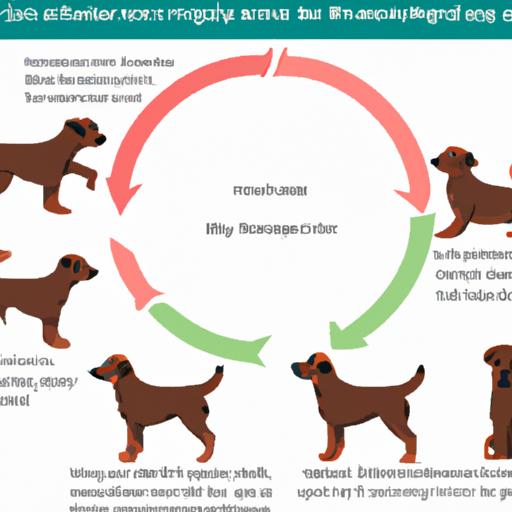Understanding Canine Reproduction
As a caregiver, you want the best for your pet. That’s why it’s crucial for you to understand your male dog’s fertility cycle. Unlike female dogs that have specific heat cycles, male dogs are fertile and capable of siring puppies as soon as they reach puberty. This stage can start as early as six months in some dogs, but in others, it might not start until they are nine months or older. It’s like turning on a switch – once it’s on, it stays on.
Signs That Your Male Dog is Fertile
Here are some signs that your male dog has reached puberty and is therefore fertile:
- Increased interest in female dogs
- Lifting the leg to urinate
- Sudden surge in aggressive behavior
- Marking territory
It’s important to remember that these signs can vary from dog to dog.
The Science Behind the Fertility of Male Dogs
Male dogs, once they reach puberty, are almost always fertile. They produce sperm constantly and have no specific breeding cycle. Unlike humans, dogs don’t have a sperm production peak or a refractory period. They can mate and potentially father puppies any day of the year.
However, the quality of the sperm can be influenced by several factors:
- Age: Although dogs remain fertile into old age, the quality and quantity of their sperm can decline.
- Health: Certain medications, illnesses, or nutritional deficiencies can affect sperm production and quality.
- Temperature: Extreme temperatures can affect a dog’s ability to produce healthy sperm.
Managing Your Male Dog’s Fertility
If you are not planning to breed your dog, neutering is the most effective way to manage his fertility. This procedure prevents unwanted pregnancies and can also reduce aggressive and territorial behavior.
On the other hand, if you plan to breed your dog, it’s crucial to ensure that he is healthy and capable of producing high-quality sperm. Regular veterinary check-ups, a balanced diet, and proper exercise are key.
The Impact of Fertility on Your Dog’s Behavior
Understanding your dog’s fertility can help you manage his behavior better. Male dogs can become aggressive or territorial when they reach puberty. They may also start marking their territory more frequently. Being aware of these changes can help you respond appropriately and ensure your dog’s well-being.
| Age | Typical Behavior | Fertility Status |
|---|---|---|
| Less than 6 months | Playful, Submissive | Not Fertile |
| 6-9 months | Increasing Aggression, Interest in Female Dogs | Becoming Fertile |
| Over 9 months | Aggressive, Territorial | Fertile |
Frequently Asked Questions
When does a male dog become fertile?
Male dogs usually become fertile when they reach puberty, which can start between six and nine months.
How can I tell if my male dog is fertile?
Signs of fertility in male dogs include increased interest in female dogs, lifting the leg to urinate, and a surge in aggressive behavior.
How can I manage my male dog’s fertility?
Neutering is the most effective way to manage your male dog’s fertility if you’re not planning to breed. Regular veterinary check-ups are crucial if you plan to breed your dog.
How does fertility affect my dog’s behavior?
Fertility can cause changes in your male dog’s behavior. They may become more aggressive or territorial and may start marking their territory more frequently.



